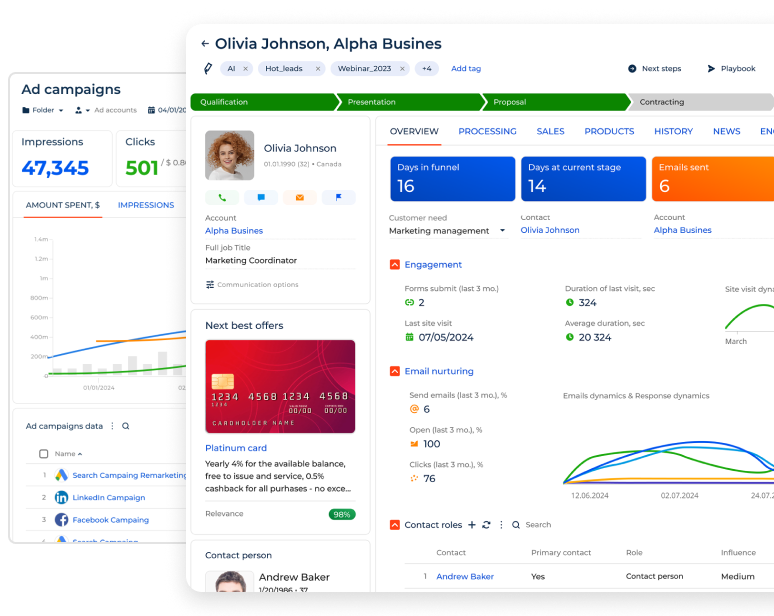-
No-code
Platform
-
Studio
No-code AI-native platform to build applications faster
Discover

-
Studio
-
AI-Native CRM


-
Industries

- Customers
-
Partners

-
About

What is Enterprise CRM? Top 14 Enterprise CRM Software for 2026
Updated on
October 28, 2025
27 min read
Drive Enterprise Growth With Creatio CRM

Originally designed for contact and deal tracking, modern CRM software has evolved into sophisticated systems that support a broad range of functions across sales, marketing, customer service, field operations, and beyond. According to Forrester, nearly 70% of enterprises now utilise CRM software to improve customer service, 64% for automating B2B sales and marketing, and 62% for managing field service operations. As organisational needs and industry expectations continue to evolve, enterprise CRM solutions are steadily broadening their capabilities to accommodate complex and specific use cases at scale.
This article examines what enterprise CRM is, outlines its key features and benefits, and provides guidance on selecting the most appropriate CRM solution for an organisation. It also reviews some of the top-performing platforms built to address the complex requirements of large enterprises in 2025 and beyond.
Core insights:
- Enterprise CRM software is purpose-built for large organisations requiring the ability to manage complex customer relationships at scale, across multiple departments, regions, and customer touchpoints.
- In contrast to CRM solutions for small and medium-sized businesses (SMBs), enterprise-grade systems offer broader functionality, deeper integrations, and advanced customisation capabilities. They are also designed to ensure compliance with industry-specific regulations and regional data protection laws.
- The core capabilities typically include 360° customer views, automation of sales and marketing, AI-driven analytics, customer service management, collaboration tools, and seamless integration with ERP, CPQ, and other enterprise systems.
- The integration of AI tools and agentic automation, alongside no-code/low-code CRM capabilities, continues to expand flexibility and intelligence, enabling organisations to automate complex workflows, accelerate processes, and deliver more personalised customer experiences.
- Leading enterprise CRM platforms include Creatio CRM, Salesforce, Microsoft Dynamics 365, HubSpot, Zoho CRM, and Oracle CX. These solutions offer powerful AI-driven functionalities, seamless scalability, advanced customisation options, and extensive integration ecosystems, equipping enterprises to support sustainable growth and achieve operational excellence.
What is enterprise CRM software?
Enterprise CRM (Customer Relationship Management) software is a comprehensive and scalable solution tailored to the needs of large organisations. It is designed to manage complex customer relationships across multiple departments, regions, and touchpoints. By handling large volumes of customer data, it supports enhanced collaboration across teams and enables the delivery of personalised interactions.
While the fundamental objective – fostering strong customer relationships — remains the same as with standard CRMs, enterprise-grade platforms are built to accommodate complex operations. They offer an advanced level of customisation, robust data management capabilities, and the flexibility required to support large-scale business environments.
The core characteristics of enterprise CRM systems include:
- Scalability: Capable of managing large volumes of data, users, and customer interactions across global teams.
- Advanced Functionality: Encompasses sales process automation, marketing and service management, automation tools, and AI-driven analytics.
- Customisability: Provides both no-code/low-code options and developer tools, enabling the creation of tailored workflows, dashboard, and user experience.
- Integration Capabilities: Seamlessly connects with ERP (enterprise resource planning) systems, e-commerce platforms, marketing tools, customer service software, and third-party applications.
- Role-Based Access & Data Security: Supports fine-grained permission controls, data governance, and compliance with international data protection regulations.
These capabilities make enterprise CRM software particularly well-suited to global enterprises, multi-division organisations, and industries with complex sales cycles, such as financial services, healthcare, manufacturing, and telecommunications.
What are the Benefits of Enterprise CRM Software?
Adoption of CRM software is particularly high among large organisations. According to Grand View Research, nearly 60% of CRM users in 2024 were enterprise-level businesses.
What is behind this trend? Below are five key benefits that help explain why large companies continue to invest in enterprise-grade CRM platforms:
| Data-Driven Insights | Enterprise CRMs bring together customer, sales, and performance data within a single platform, enabling teams to uncover actionable insights with ease. Marketing teams can analyse customer behaviour and engagement pattern to fine-tune campaign strategies, while sales representatives can evaluate pipeline health, identify high-value prospects, and deliver personalised sales offers. Customer service teams benefit from access to detailed client data, allowing them to enhance response quality and resolve issues more effectively. In addition, CRM data supports performance monitoring, enabling leaders to identify process inefficiencies and optimise team workflows. |
| Enhanced Collaboration & Employee Productivity | By centralising information across departments, enterprise CRM software eliminates data silos and ensure that all teams are working from a single source of truth. Features such as shared dashboards, task automation, and real-time updates help improve internal coordination, streamline communication, and enable staff to focus on high-value activities. |
| Improved Customer Relationships | CRM software enables businesses to personalise communication, anticipate customer needs, and deliver more consistent support by providing a complete view of customer data and interactions. With access to detailed histories, preferences, and feedback, service and sales teams are better equipped to engage effectively and foster long-term customer loyalty. |
| Increased Sales Performance | By streamlining lead management and marketing automation, enterprise CRM systems enable teams to nurture prospects effectively throughout the entire customer journey. They also provide advanced capabilities such as sales forecasting, trend analysis, and segmentation, helping teams to prioritise their efforts and identify high-value opportunities for cross-selling and upselling. |
| Flexibility & Scalability | Enterprise CRM platforms are rich in functionality and well-equipped to support a wide range of business processes across large organisations. Enabled by no-code and low-code tools, these platforms offer a high degree of customisation without the need for extensive IT involvement. Furthermore, compared to SMB-focused solutions, these platforms provide more cost-effective models tailored to the need of enterprise users. |
Key Features of an Enterprise CRM System
Modern enterprise CRM software offers a broad set of features, which may vary depending on an organisation’s specific business processes and industry requirements. Based on an analysis of leading CRM solutions, eight essential capabilities have been identified as key considerations when evaluating platforms for enterprise use.
360 Customer View
The 360-degree customer view is a fundamental feature of enterprise CRM systems that bringings together key customer data, such as contact information, behaviours, preferences, and interaction history, into a single, unified platform. It provides teams with real-time access to comprehensive customer profiles, enabling more in-depth understanding of customer needs and behaviour at every stage of the journey.
This comprehensive solution also facilitates seamless collaboration across departments. For instance, sales representatives can score leads and monitor deal progress, while customer service teams can access data to reference previous interactions and escalate issues efficiently, enabling them to resolve client enquiries at scale.
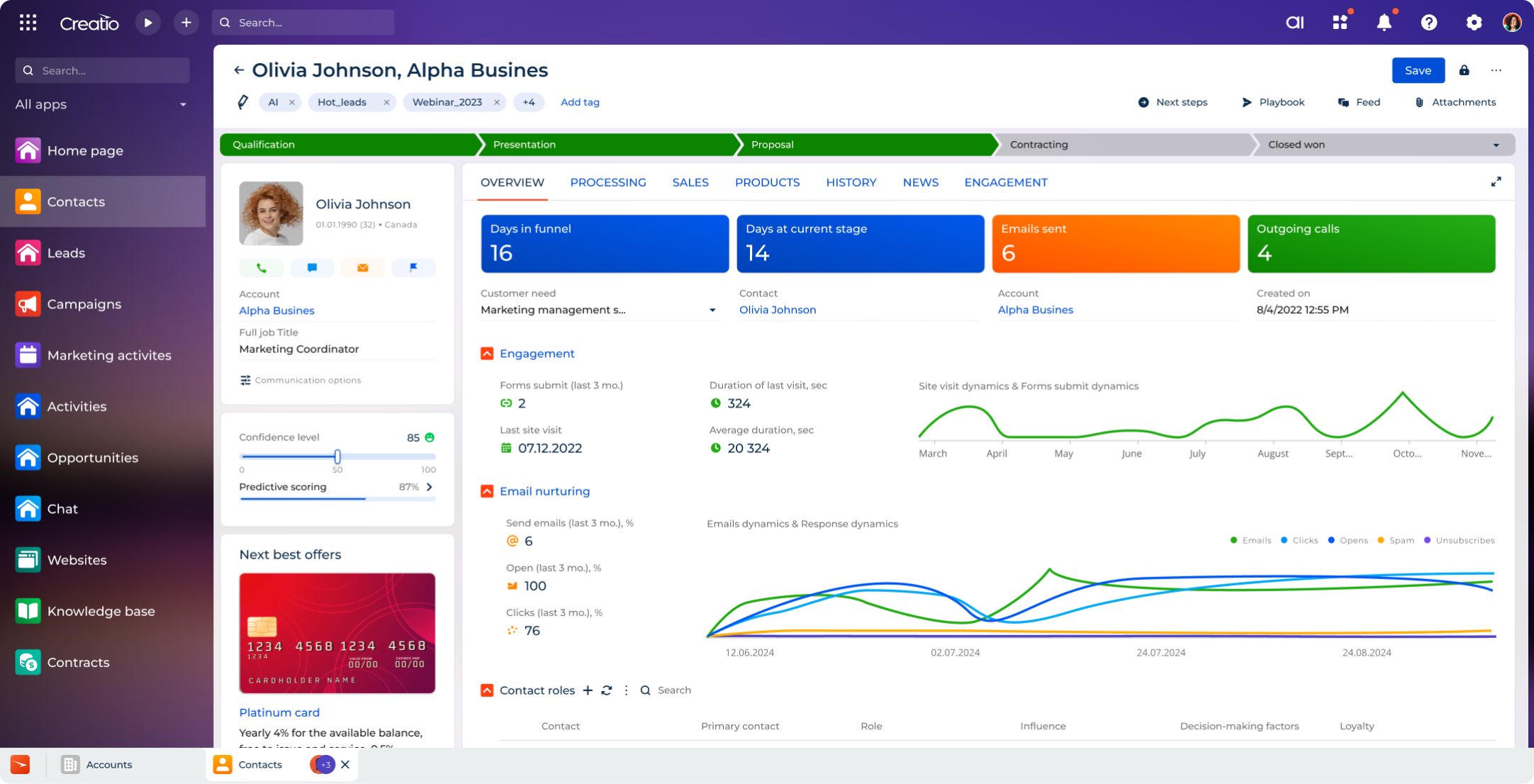
Example of Customer 360 in Enterprise CRMs
Sales Automation
CRM platforms have become essential tools for sales professionals, enabling them to boost productivity and drive revenue growth. These systems support a board spectrum of activities, from managing prospects and tracking opportunities to forecasting future sales performance.
At the enterprise level, the feature set must be robust enough to handle complex workflows, large sales teams, and extensive datasets. The core functionality required in enterprise-grade CRM for sales management typically includes:
- Advanced lead and opportunity management: track, score, assign, and prioritise leads based on source, behaviour, and deal potential.
- Sales pipeline management and sales forecasting: visualise each stage of the sales pipeline, monitor deal progress, and generate real-time sales forecasts.
- Sales automation and workflow customisation: automate routine tasks such as follow-ups, data entry, and approvals; customise workflows to align with the organisation’s sales processes.
- Sales analytics and reporting: monitor sales trends, activities, and overall performance
- Contract and document management: securely store, manage, and track sales-related documents, with version control and approval processes.
- AI-driven recommendations and next best actions: identify high-potential leads, predict future sales, and receive data-driven suggestions for customer engagement.
- Task management and productivity tracking: assign, prioritise, and monitor tasks across teams while tracking individual and team performance metrics.
All of these CRM capabilities help to lighten the workload for sales teams, enabling them to concentrate on their core activities – building customer relationship and closing deals.
Marketing Automation
Enterprise CRM systems also play a vital role in marketing operations, allowing organisations to streamline and scale their efforts through data-driven, automated workflows. These platforms enable teams to autonomously plan, execute, and monitor campaigns across a range of channels, both digital and offline, including email, social media, events, and more.
With features such as behaviour analysis, audience segmentation, and lead scoring, enterprise CRMs help personalise customer experience and develop campaigns that drive engagement. In addition, marketing automation tools supports campaign scheduling, A/B testing, and performance tracking, empowering teams to improve efficiency and measure ROI with greater accuracy.
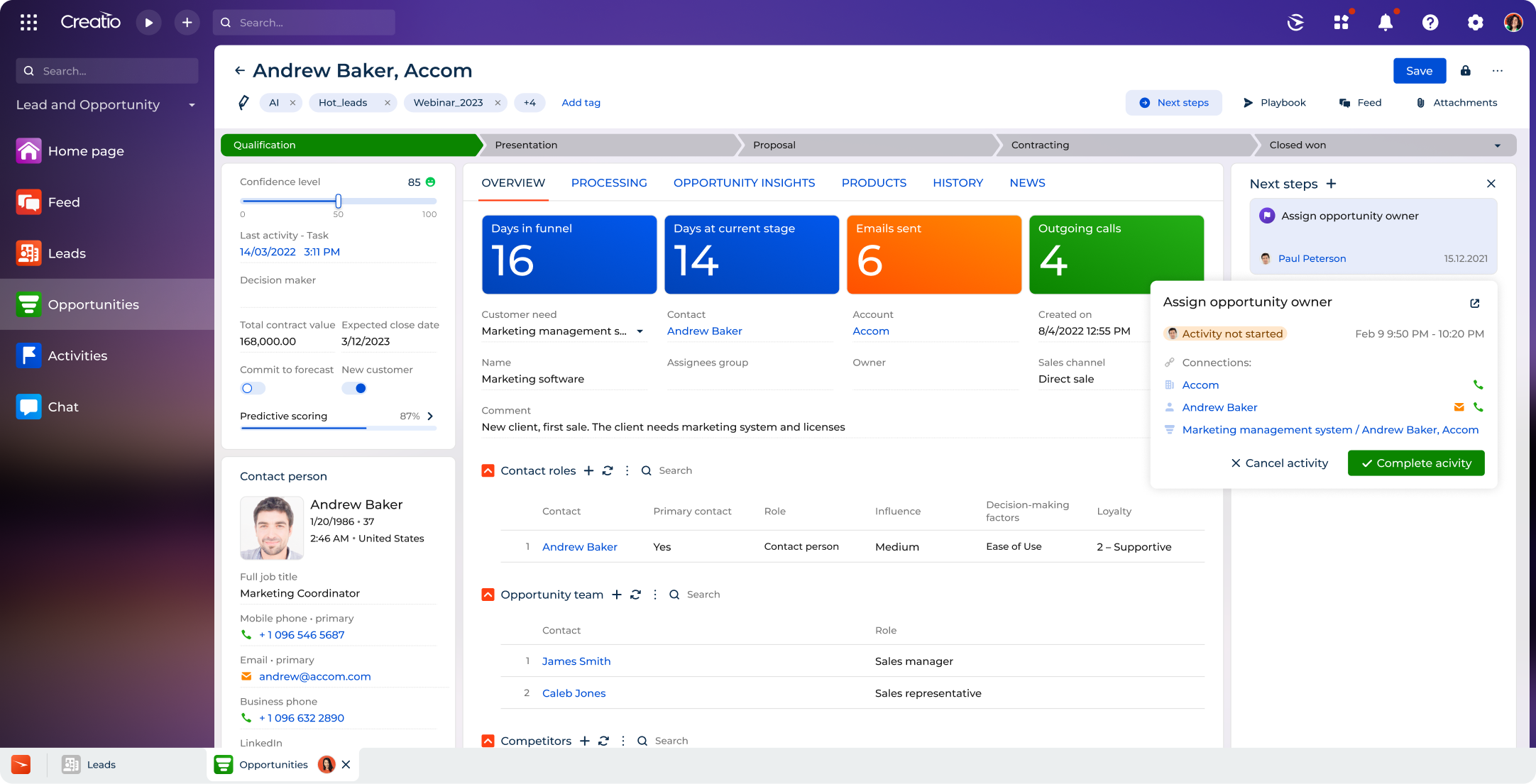
Example of Marketing Lead Automation and Management
Customer Service and Support
CRM software serves as a valuable source of comprehensive customer data, enabling businesses to deliver fast, consistent, and personalised support at scale. By centralising interaction history, service requests, and customer feedback within a single platform, CRM tools empower support teams to respond more quickly and resolve issues with greater efficiency.
Enterprise CRM systems often include features such as case management, SLA monitoring, omnichannel support (including email, chat, phone, and self-service portals), and integration with knowledge bases . These capabilities enable businesses to improve response times, maintain high service standards, and ensure alignment actress customer-facing teams and communication channels.
For example, when a customer submits a support ticket, the CRM automatically routes it to the most appropriate agent based on the nature or priority of the issue. Simultaneously, it provides the support representative with full visibility into the customer’s previous interactions and preferences, enabling a more personalised and efficient case resolution.
Collaboration and productivity tools
Collaboration functionality is a key component of modern enterprise CRM systems. Designed to facilitate seamless interactions across departments, these platforms typically offer features such as shared dashboards, task assignments, role-based access controls, internal comments, and activity feeds. Such tools help eliminate information silos, reduce the need for manual coordination, and ensure that all teams have the context required to act swiftly and effectively.
For instance, when a sales representative updates the status of a lead, teams in marketing and customer support can instantly view the change and adjust their activities accordingly, ensuring a consistent customer experience across all touchpoints.
Analytics and reporting
By collecting and organising key metrics in a centralised system, enterprise CRMs enable businesses to gain actionable insights and make data-driven decisions. These systems draw on data from across departments, such as sales, marketing, and customer service, to monitor performance, identify emerging trends, and highlight areas for improvement.
Enterprise CRM solutions typically offer customisable dashboards, advanced filtering options, and role-specific reporting tools, enabling users to focus on the metrics most relevant to their responsibilities. Whether tracking lead conversion rates, campaign ROI, service resolution times, or sales forecasts, these features help teams understand what is performing well and where further optimisation is needed. Moreover, reporting processes can be fully automated, delivering timely insights into customer behaviour and overall business performance.
Effortless integration and marketplace
Although enterprise CRM platforms offer a wealth of out-of-the-box functionality, integration with other business tools, such as enterprise resource planning (ERP), marketing automation platforms, communication tools, billing systems, and file management software, is essential. These integrations allow businesses to extend the capabilities of CRM, streamline internal operations, enhance productivity, and deliver greater value to customers.
Many leading CRM providers also offer access to comprehensive application marketplaces. These marketplaces offer a wide selection of prebuilt connectors, industry-specific modules, and third-party extensions, allowing businesses to expand system functionality without the need for extensive development work. In turn, this helps support unique business processes and ensure smoother collaboration across departments.
AI-Native tools and agents
AI has evolved from being an optional feature to a fundamental component of enterprise CRM systems. Today, AI tools and agents are deeply embedded across workflows, including sales, marketing, customer service, and industry-specific operations. According to Creatio’s “State of AI Agents & No-Code” survey, AI agents are increasingly seen as a strategic priority, with 86% of executives considering them critical to their business objectives.
This trend reflects the growing need for systems that enable faster and more informed decision-making. AI-powered enterprise CRMs help organisations shift from reactive to proactive operations by analysing large volumes of data, learning from previous interactions, and continuously optimising performance. The result is improved accuracy, efficiency, and personalisation throughout the customer journey.
Key AI capabilities in enterprise CRM software include:
- Predictive Analytics: forecast sales trends, identify high-conversion leads, and anticipate customer churn based on historical and behavioural data.
- Generative AI: create personalised emails, campaign content, or follow-up messages using customer insights and engagement history.
- Next-best-action recommendations: provide sales and service teams with AI-powered guidance on optimal follow-ups, tailored offers, or content delivery.
- Role-specific AI agents: configurable digital assistants that automate complex workflows and execute routine tasks, such as reassigning leads, scheduling reminders, or updating records.
- Conversational AI and chatbots: deliver real-time support and qualify leads through intelligent virtual assistants integrated directly within the CRM environment.
As AI continues to driver enterprise efficiency, selecting a robust, AI-native CRM that aligns with business objectives is essential for accelerating time to value and achieving measurable outcomes.
No-Code customisation
Modern enterprises are increasingly turning to no-code and low-code CRM capabilities, which allow business users to configure complex workflows, interfaces, and automations without the need for advanced technical expertise. These capabilities enable enterprises to adapt processes more rapidly, reduce pressure on IT teams, and accelerate digital transformation initiatives.
According to Creatio’s 2025 Global Survey Report on AI Agents & No-Code, 67% of organisations have already deployed low-code/no-code platforms to improve agility and responsiveness to change. By supporting intuitive customisation and user-friendly interfaces, no-code CRMs help enterprises remain flexible, innovative, and scalable in an ever-evolving business environment.
The State of AI Agents & No-Code
Learn how 560+ leaders across the world use AI and no-code to drive innovation today
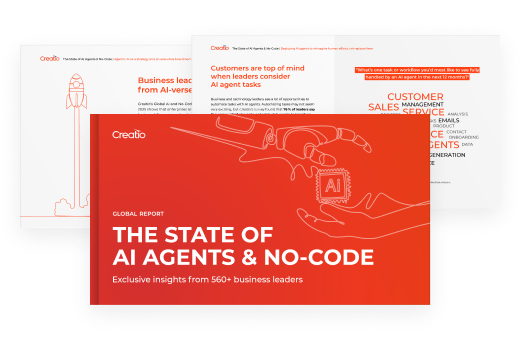
Enterprise-grade security
Security and compliance remain key priorities for enterprise CRM systems. Modern platforms are equipped with features such as role-based access control, SSO/SAML authentication, data encryption, and audit logging to safeguard sensitive customer information and internal records. Many also offer regional data residency options to meet privacy regulations such as UK GDPR, CCPA or industry-specific standards like HIPAA. Enterprise CRMs must provide governance tools, activity monitoring, and round-the-clock SLA-backed support to ensure reliable performance and full protection of business data.
14 Best Enterprise CRM Software in 2026
Having explored the key features and benefits of enterprise CRM systems, the next step is to consider the leading solutions available on the market. Below is a brief overview of the most widely used enterprise CRM platforms, covering their core capabilities, distinctive features, and the types of organisations that are likely to benefit most from each solution.
CRM Platform | Distinctive Features | G2 Rating |
| Creatio CRM |
| 4.8 / 5 |
Microsoft Dynamics 365
|
| 4.3 / 5 |
| Oracle CX |
| 4.2 / 5 |
| Salesforce |
| 4.4 / 5 |
| HubSpot |
| 4.5 / 5 |
| Zoho CRM Plus |
| 4.4 / 5 |
| ServiceNow |
| 4.1 / 5 |
| SAP CRM |
| 4.0 / 5 |
| Pega |
| 4.2 / 5 |
| Freshworks |
| 4.6 / 5 |
| ZenDesk |
| 4.3 / 5 |
| LeadSquared |
| 4.6 / 5 |
| Pipedrive |
| 4.5 / 5 |
| Infor CRM |
| 4.1 / 5 |
1. Creatio
Creatio is a comprehensive agentic CRM suite designed for enterprises, offering solutions for sales, marketing, and customer service automation integrated on one no-code platform. This robust enterprise CRM helps businesses automate the entire customer journey with a maximum degree of freedom, streamline customer relationship management, and enhance employee productivity.
Creatio provides a unified, customisable agentic platform that brings together core CRM functionalities to support critical business workflows. Its composable no-code architecture allows enterprises to tailor their CRM solution to meet specific objectives and operational requirement, without the need for ongoing IT involvement. In addition, businesses can select from over 20 industry-specific workflows that support specialised processes in sectors such as financial services, manufacturing, transportation, and more.
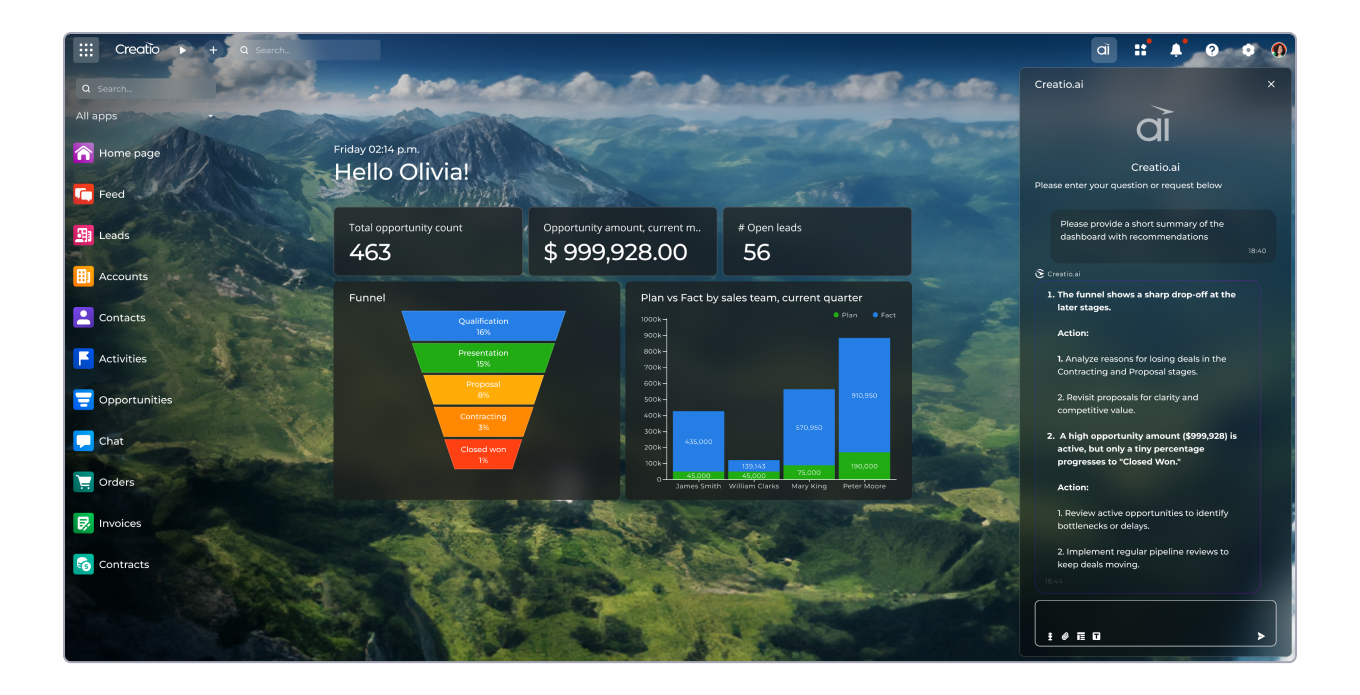
Creatio’s Unified CRM Suite includes:
- Creatio Marketing – An AI-native marketing automation platform designed to streamline lead management and drive revenue growth. It enables businesses to segment audiences, track customer interactions, personalise campaigns, and optimise outcomes through AI-powered analytics.
- Creatio Sales – An AI-driven sales automation platform that enhances sales performance with features such as opportunity scoring, sales forecasting, contract management, and intelligent data analytics.
- Creatio Service – A unified service management platform that elevates customer experience through AI-enabled case management, issues resolution, sentiment analysis, and seamless collaboration across teams.
Creatio adheres to the highest enterprise standards for security, scalability, and flexibility. It supports an unlimited number of users and large data volumes across distributed teams, with deployment options in both cloud and on-premise environments. The platform offers robust security and compliance controls, including role-based access, data encryption, regional data residency and 24/7 enterprise SLAs. Creatio also integrates seamlessly with widely used business tools such as Microsoft Teams, Outlook, and other enterprise applications, enabling organisations to enhance productivity and collaboration across the entire ecosystem.
Furthermore, the platform supports integration with over 700 third-party tools and applications, allowing businesses to extend functionality and unify their existing technology stack within a single, cohesive solution. This high level of connectivity ensures a smooth flow of data throughout the entire business ecosystem, delivering clear insights into customer interactions, sales and marketing performance, and team productivity.
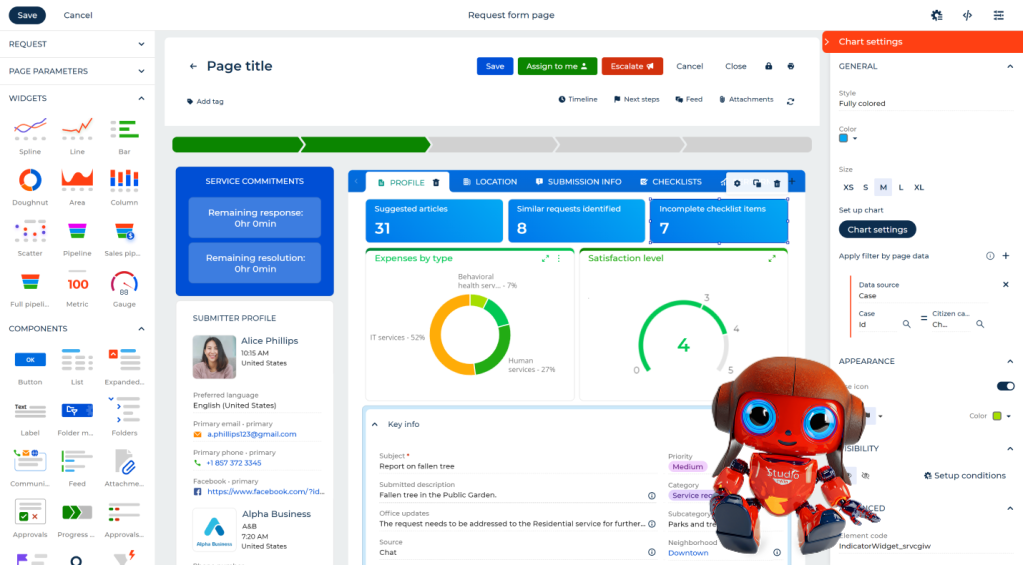
With advanced AI capabilities integrated into the system, Creatio CRM enables seamless automation and optimisation of a wide range of business operations. Generative AI supports the creation of personalised marketing and sales content, tailoring communications to individual customer profiles. Predictive AI suggests next-best-offer recommendations and supports data-driven decision-making. Meanwhile, agentic AI empowers enterprises to automate complex workflows and tasks, improving productivity and enhancing customer-facing processes.
Distinctive features of Creatio CRM
- 360° customer view: a comprehensive view of contacts and accounts, including customer data, interaction history, preferences, and activity across departments.
- Campaign management: end-to-end automation of marketing campaigns across multiple channels, with tools for audience segmentation and performance tracking.
- Lead and opportunity management: full-cycle lead automation and pipeline management, enabling the capture, scoring, assignment, and conversion of leads throughout the sales journey.
- Sales productivity: a suit of tools for managing sales tasks, communications, and team collaboration within a coordinated workspace.
- Order and contract management: a unified platform for managing quotes, contracts, and approvals across the entire order lifecycle.
- Case management: streamlined tools to register, route, and resolve customer queries, with built-in SLA tracking and automated escalation rules.
- Contact centre: a unified agent interface providing real-time access to customer information, assigned tasks, performance analytics, and communication tools.
- Knowledge management: a centralised repository for storing and sharing useful resources, including FAQs and service documentation.
- Advanced data analytics and reporting: customisable dashboards and reporting tools for tracking key performance indicators, customer behaviour, and team performance metrics.
- AI-Native Capabilities: built-in generative, predictive, and agentic AI features integrated across the platform, included in all plans at no additional cost.
Intended audience
Enterprises seeking a flexible, scalable solution with advanced customisation and AI-powered capabilities.
Creatio pricing
Creatio provides transparent pricing with no hidden charges, and includes optional add-ons to support essential processes and workflows. The pricing model is composable, allowing organisations to select and pay only for the functionalities they require. Notably, AI capabilities, including Predictive AI, Generative AI, and Agentic AI, are included as standard across all plans, at no additional cost.
For enterprise-level companies, Creatio provides two pricing tiers:
- Enterprise: £42 ($55) per user per month, which delivers core enterprise functionalities
- Unlimited: £65 ($85) per user per month, encompassing additional benefits such as unlimited database storage, governance for no-code applications, advanced support, and a host of other premium features.
Creatio also provides a 14-day free trial, allowing organisations to explore the platform’s functionality and capabilities.
2. Microsoft Dynamics 365
Dynamics 365 is an integrated suite of enterprise resource planning and customer relationship management applications developed by Microsoft. In addition to core sales and customer service products, the platform includes solutions for finance, project operations, contact centre, supply chain management, HR, commerce, and more.
This CRM offers a wide range of ERP business applications and integrates seamlessly with other Microsoft products. With pre-configured AI models, it enables teams to identify churn risk, estimate customer lifetime value, uncover common trends, and receive data-based recommendations to improve customer experience. Furthermore, businesses can purchase additional tools to automate processes and customise their workflows.
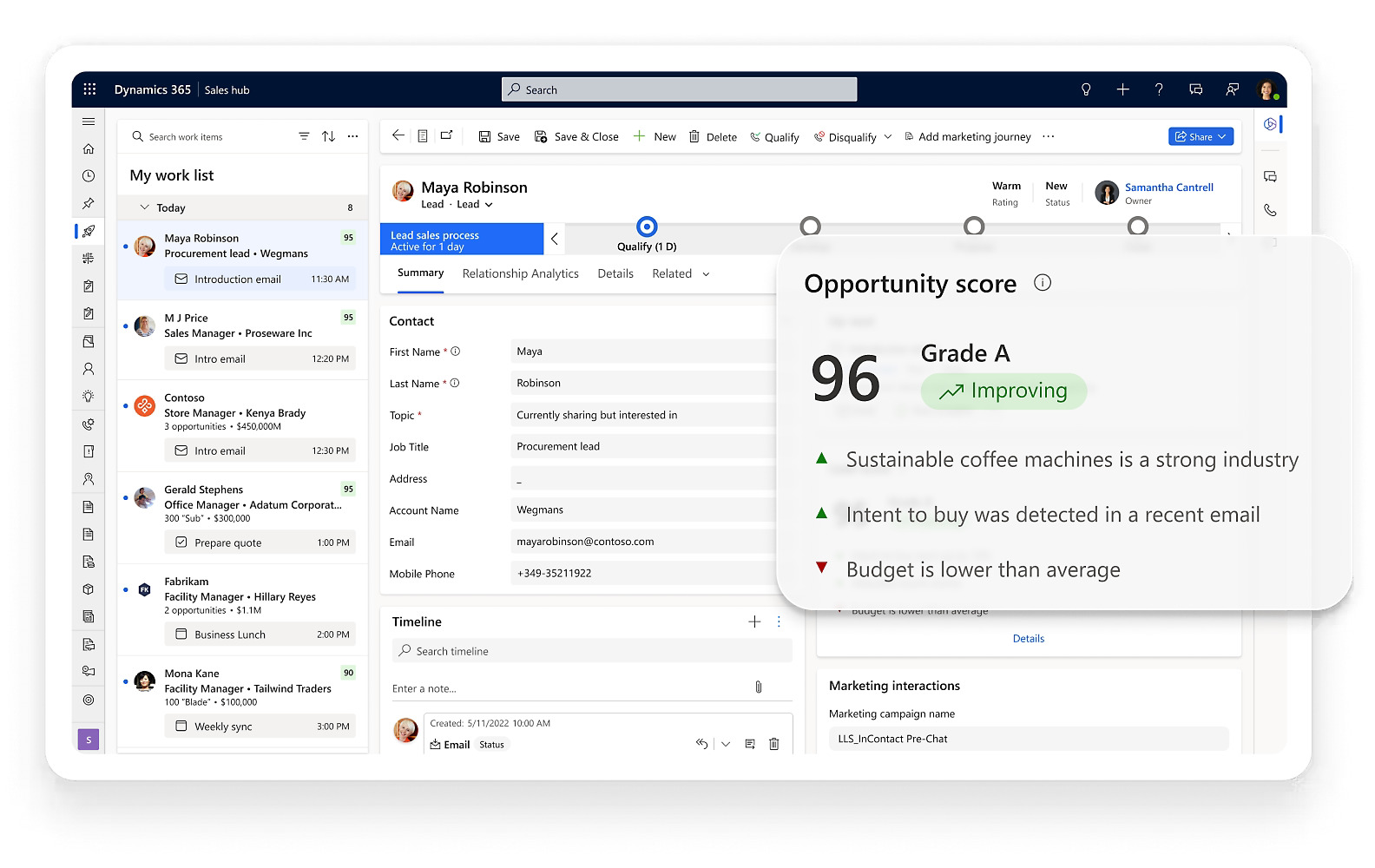
Distinctive features of Dynamics 365
- Sales force automation
- Advanced sales engagement
- Copilot capabilities
- Analytics and KPI reporting
- Contact centre
Intended audience
Microsoft Dynamics 365 is particularly well-suited for larger, resource-abundant enterprises that do not necessitate extensive customisation tools and demonstrate a preference for the Microsoft ecosystem.
Dynamics 365 pricing
Sales and Service modules are charged separately, with each priced at £105 per user per month
3. Oracle CX
Oracle is an enterprise-grade customer experience (CX) software designed to support highly specialised workflows across a wide range of industries, including communications, utilities, financial services, public sector, healthcare, retail, construction, and more. It provides industry-specific CRM solutions that can be tailored to align with the unique goals and operational needs of each organisation.
The Oracle CX suite offers comprehensive modules spanning sales, marketing, and customer service. Its Sales and Marketing applications are commonly used to improve customer engagement and manage complex revenue operations, while the Service platform provides multichannel capabilities, knowledge management, and self-service tools to optimise customer support efficiency.
While Oracle CX is recognised for its product depth and strong focus on industry verticals, some clients have encountered challenges related to tool fragmentation and extended implementation timelines. This can delay realisation of value and require greater investment in integration and user training.
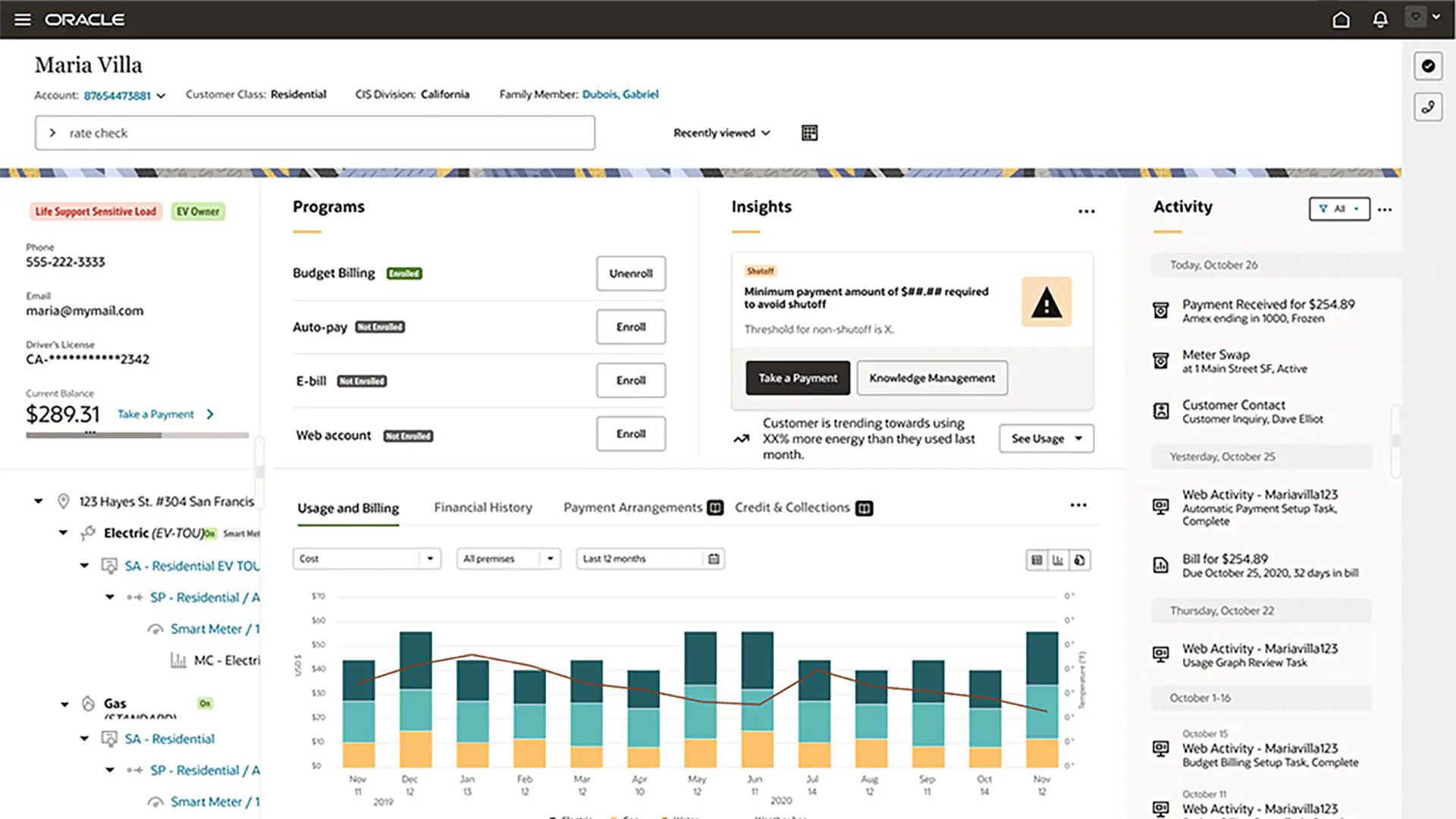
Distinctive features of Oracle CX
- Account and customer profiles
- Journey orchestration
- Sales force automation
- Sales planning and performance management
- Customer help centre
Intended audience
Companies necessitating highly-specialised workflows are likely to derive the greatest advantage from Oracle’s offerings.
Oracle CX pricing
Oracle employs a complex, modular pricing system, whereby charges are based on the specific modules and industry configurations selected. Accurate pricing estimates for enterprises are available on request.
4. Salesforce
Salesforce is one of the most widely adopted CRM platforms in the enterprise market, enabling large organisations to manage customer relationships through automated workflows, unified data, AI-powered analytics, and a comprehensive suite of modular CRM applications. It provides integrated solutions across sales, service, marketing, and commerce, allowing cross-functional teams to collaborate within a single platform and deliver personalised customer experiences at scale.
The Salesforce ecosystem features an extensive portfolio of tools, prebuilt templates, and one of the largest developer communities in the CRM space. Its built-in AI toolset, Einstein AI, supports data-driven decision-making by identifying trends, recommending next actions, and forecasting performance. However, many enterprise users report a relatively steep learning curve, along with high implementation and maintenance expenses. As such, fully unlocking its potential often requires dedicated technical support and ongoing investment.
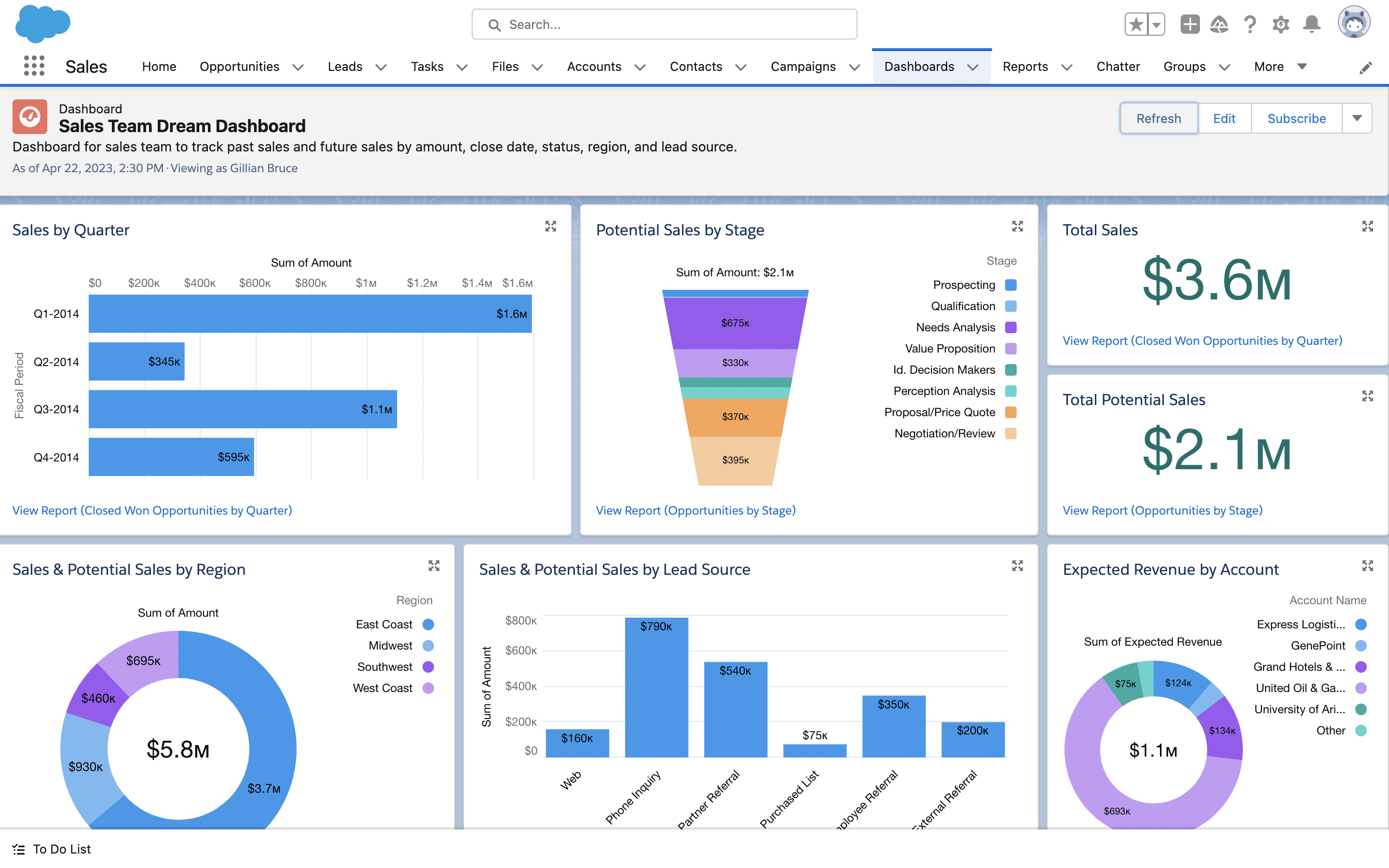
Distinctive features of Salesforce
- Contact and account management
- Lead and opportunity management
- Quote management
- Workflow automation
- Activity management
- Einstein AI
Intended audience
Large enterprises prepared to allocate the necessary time and financial resources into a comprehensive, multi-functional enterprise CRM solution would find Salesforce fitting.
Salesforce pricing
Enterprise plan starts at £127 per user per month, the AI features are paid separately
See also: Salesforce Alternatives and Competitors
5. HubSpot
HubSpot is a widely adopted CRM solution that provides a unified platform encompassing marketing, sales, service, content management, operations, and commerce. Highly versatile and scalable, it is well-suited to organisations of all sizes – from start-ups to large enterprises.
Its composable architecture allows each module to align with specific enterprise objectives. The Marketing Hub supports lead generation and cross-channel campaign management. The HubSpot Sales Hub enhances sales team productivity with tools for pipeline management, email tracking, and task automation. The Service Hub streamlines customer support operations, improving response times and overall customer satisfaction. The Content Hub enables teams to create, manage, and optimise digital content, while the Operations Hub ensures clean, synchronised, and automated data flows across systems, supporting better internal alignment. Lastly, Commerce Hub handles essential B2B transaction processes, including invoicing and payments.
HubSpot also supports extensive third-party integration capabilities, allowing businesses to tailor their technology stack to suit specific operational requirements.
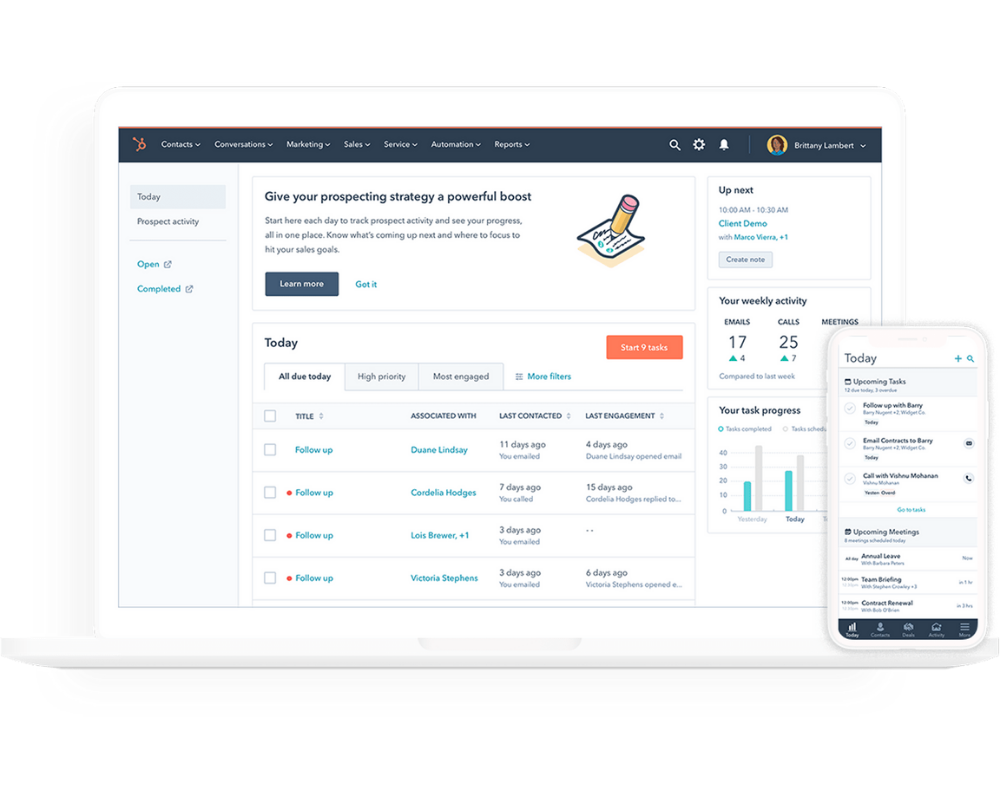
Distinctive features of HubSpot
- Contact and lead management
- Marketing automation
- Sales pipeline management
- Website and campaign analytics
- Live chat and conversational tools
Intended audience
Medium-sized enterprises seeking a straightforward, user-friendly CRM solution, with a limited scope for customisation but pronounced emphasis on marketing functionalities.
HubSpot pricing
£4700 per month, which includes provisions for 7 seats, additional seats starting at £75 per month
6. Zoho CRM Plus
Zoho CRM Plus is a comprehensive solution for customer relationship management solution tailored to the needs of growing businesses and large enterprises. It offers a unified platform that brings together sales, marketing, customer service, analytics, and basic AI-powered automation.
With a modular architecture and access to over 50 integrated applications within the Zoho ecosystem, enterprises can customise and extend functionality in line with their specific operational requirements. It supports multichannel engagement, including email, phone, chat, social media, and web forms, and its extensive business intelligence and analytics tools enable teams to manage leads, forecast sales, and streamline operations.
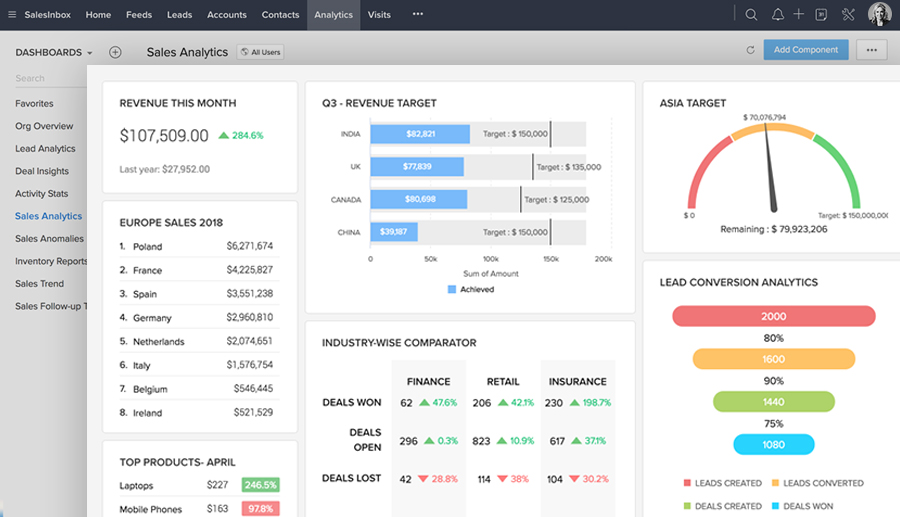
Distinctive features of Zoho CRM
- Lead and contact management
- Sales automation and forecasting
- Social media management
- Project collaboration
- AI-driven insights with Zia
- Omnichannel communication (email, phone, social, chat)
Intended audience
Zoho is particularly well-suited for medium-market businesses that necessitate flexible CRM with strong integration within the broader Zoho ecosystem.
Zoho CRM Plus Pricing
The pricing starts at £69 per user per month, a free trial is available.
7. ServiceNow
ServiceNow is an enterprise-grade CRM and automation platform designed to support organisations in managing sales, fulfilment, and customer service through a single, unified system. It provides solutions for customer service, field service, and sales and order management, enabling businesses to coordinate complex, cross-functional operations with greater efficiency.
The platform places a strong emphasis on unified customer data, pre-configured workflows, and integrated AI capabilities. However, enterprises considering ServiceNow as a comprehensive CRM solution should be aware of its limited marketing functionality, and the possibility that certain out-of-the-box features may require additional customisation for full deployment.
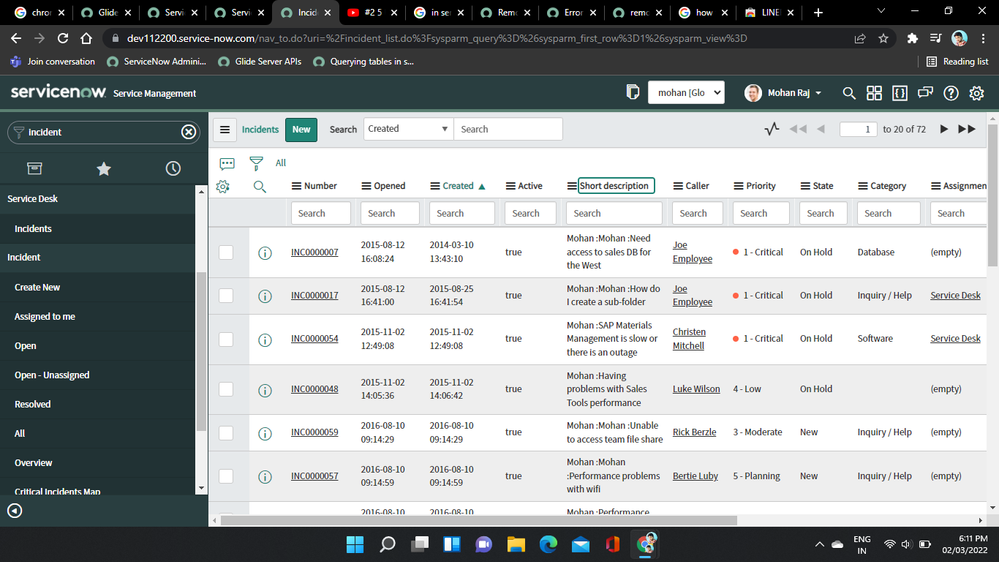
Distinctive features of ServiceNow
- Unified customer data and analytics
- Customer service management (CSM)
- Field service management
- Sales and order management
- Self-service portal and engagement messenger
Intended audience
Large enterprises and service-driven organisations that require deep business automation and seamless coordination between sales and service departments.
ServiceNow pricing
Available upon request.
8. SAP CRM
SAP's CRM and Customer Experience (SAP CX) is an enterprise-grade platform designed to support large organisations in managing client data, sales, service, marketing, and e-commerce processes at scale. As part of the wider SAP ecosystem, it offers deep integration with specific SAP business modules, facilitating seamless data flow across finance, supply chain, and customer-facing teams.
The platform enables organisations to connect critical business functions and gain end-to-end visibility across the entire customer journey. Additionally, it enables smoother interdepartmental data exchange, enhances compliance, and supports informed, AI-drviven decisions.
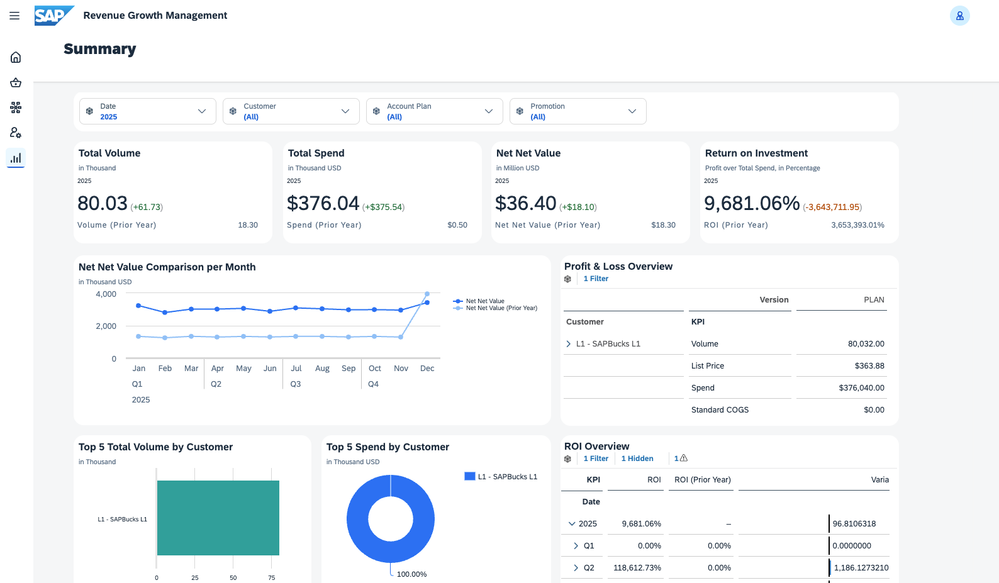
Distinctive features of SAP CRM
- Customer 360
- Sales and service automation
- B2B commerce and quote management
- Native enterprise resource planning (ERP) integration
- Sales forecasting and next-best-actions suggestions
Intended audience
SAP CRM is poised to deliver optimal value to companies already entrenched within SAP’s extensive ecosystem, particularly those that place a significant emphasis on data management.
SAP CRM pricing
Individual pricing for each client, available upon request
9. Pega
Pega is a cloud-based CRM solution that provides end-to-end automation and engagement across the entire customer journey. It offers dedicated solutions for customer service, sales automation, and a Customer Decision Hub, which leverages predictive analytics to anticipate customer needs and personalise interactions across channels.
A key strength of Pega CRM lies in its industry-specific capabilities. The platforms supports tailored workflows for sectors such as financial services, insurance, telecommunications, healthcare, and government, enabling organisations to align the system closely with complex, highly regulated business requirements.
A defining feature of Pega CRM is its integration of advanced analytical modelling with business logic. This combination enables organisations to personalise and optimise outcomes for individual customers, enhancing the overall customer experience and driving improved results.
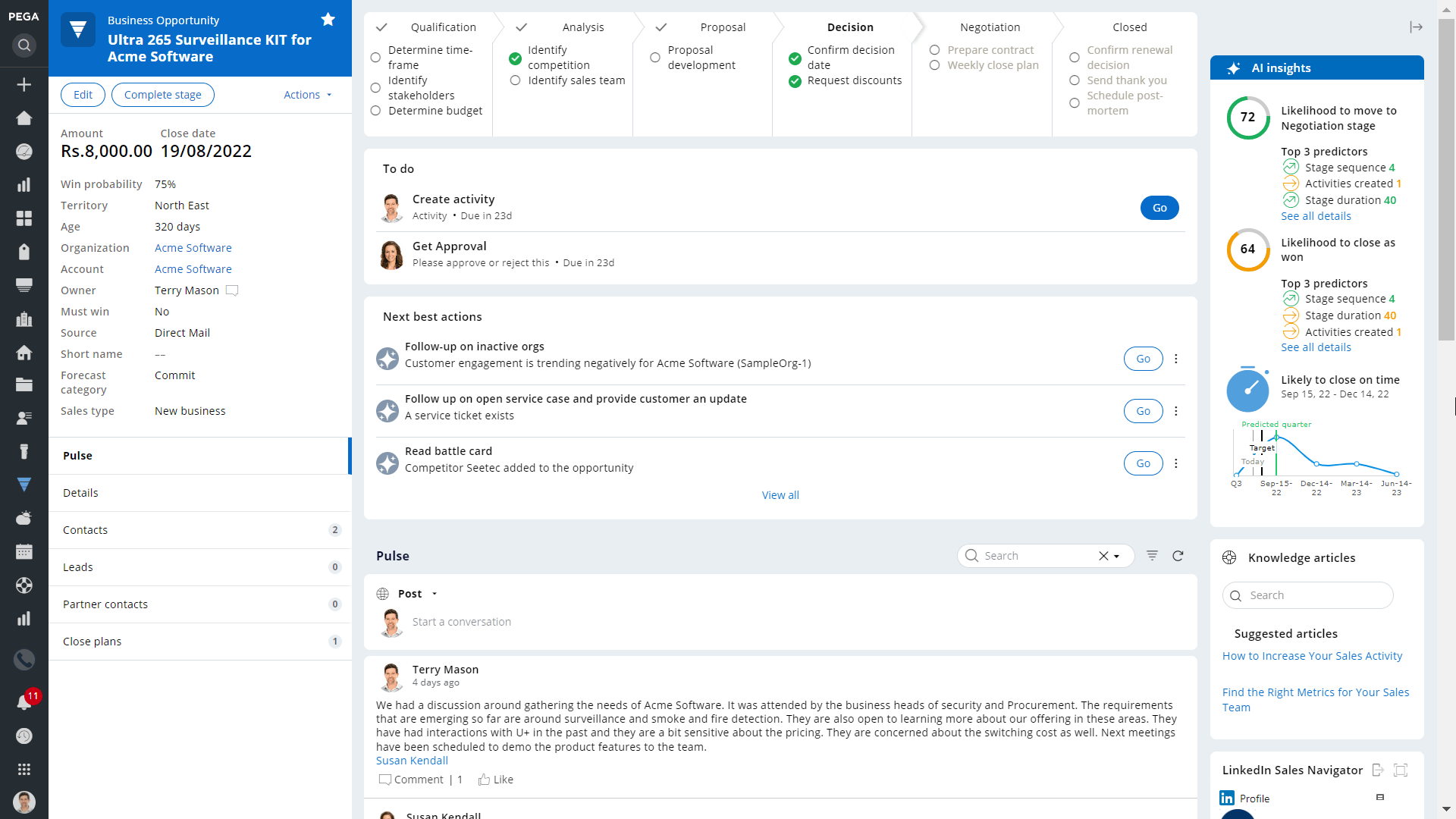
Distinctive features of Pega
- Contact centre desktop
- Customer service AI
- Case management
- AI-guided selling
- Partner relationship management
Intended Audience
Pega is particularly advantageous for large enterprises that are engaged in the management of intricate processes.
Pega Pricing
Starts at £90 per user per month, a free trial is provided.
10. Freshworks
Freshworks CRM (formerly known as Freshsales) is a user-friendly customer relationship management platform that brings together sales and marketing operations, while also enhancing customer service capabilities. The platform comprises four integrated solutions: Freshmarketer, Freshsales, Freshdesk, and Freshchat. They can operate cohesively within a unified ecosystem to streamline customer engagement across multiple channels.
Its modular architecture allows enterprises to tailor features to suit specific business requirements. With an intuitive interface and powerful automation capabilities, teams can manage leads, execute workflows, and extract actionable insights to support business growth. However, while Freshworks is highly accessible and easy to use, it may not fully meet the operational complexity and customisation demands of large enterprise clients.
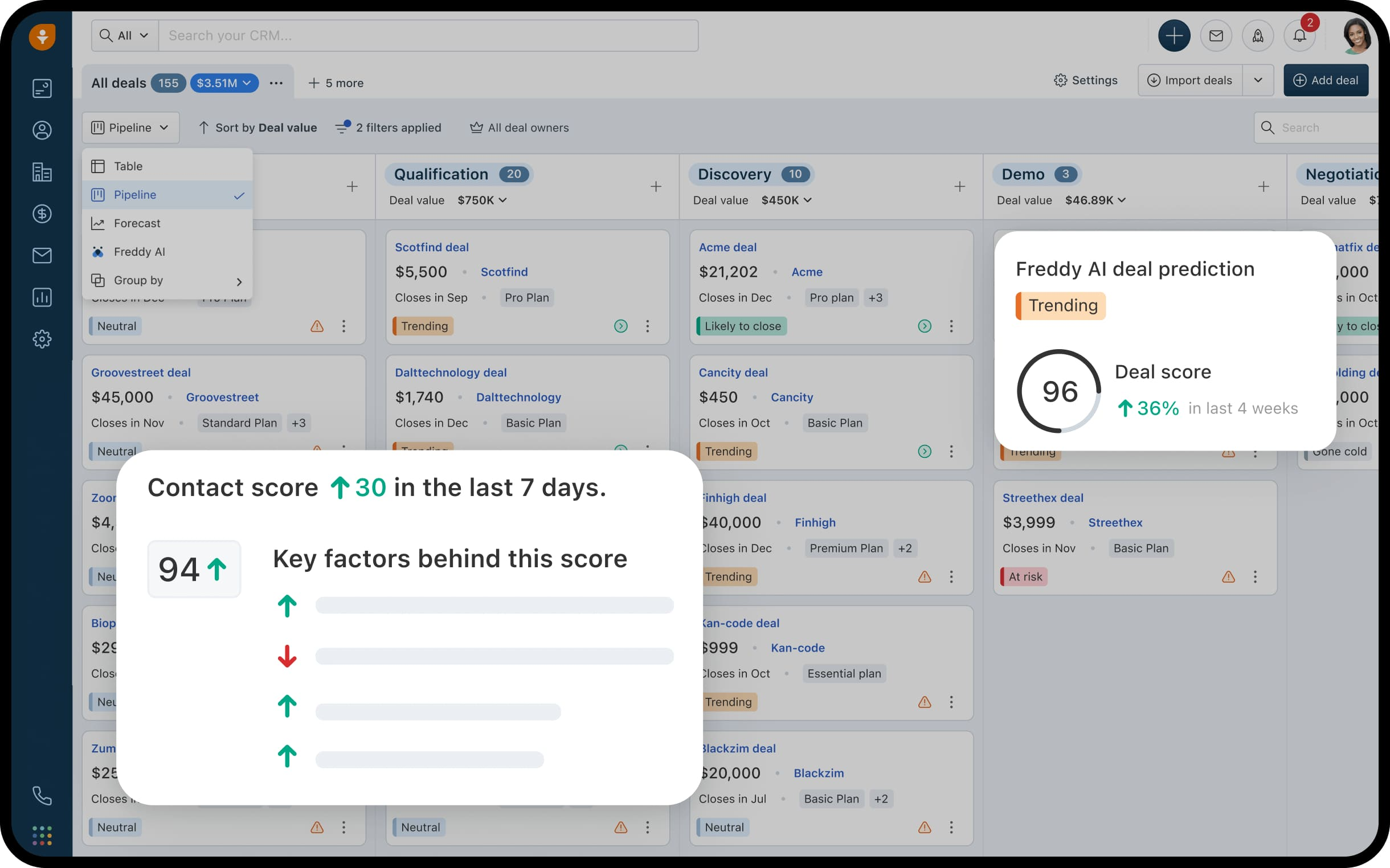
Distinctive features of Freshwork
- Lead scoring and deal insights
- Omnichannel communication
- Multichannel marketing campaign management
- Customisable dashboards and reports
Intended audience
Freshworks is particularly well-suited to medium-sized organisations that place a premium on ease of use and rapid deployment, whilst possessing a moderate requirement for comprehensive analytics and customisation.
Freshworks CRM pricing
Starts at £71 per user per month for the Freshsales Suite, covering sales and marketing. Customer service products, such as Freshdesk, are purchased separately, starting at £95 per user per month.
11. ZenDesk
Zendesk is a comprehensive platform suitable for both enterprise and SMB users. It offers an intuitive interface and a broad set of tools designed to support customer relationship management. Its customisable dashboard enables teams to centralise key customer data across departments, fostering effective collaboration and improved productivity. In addition, the platform provides a range of out-of-the-box features that support quick and straightforward integration processes.
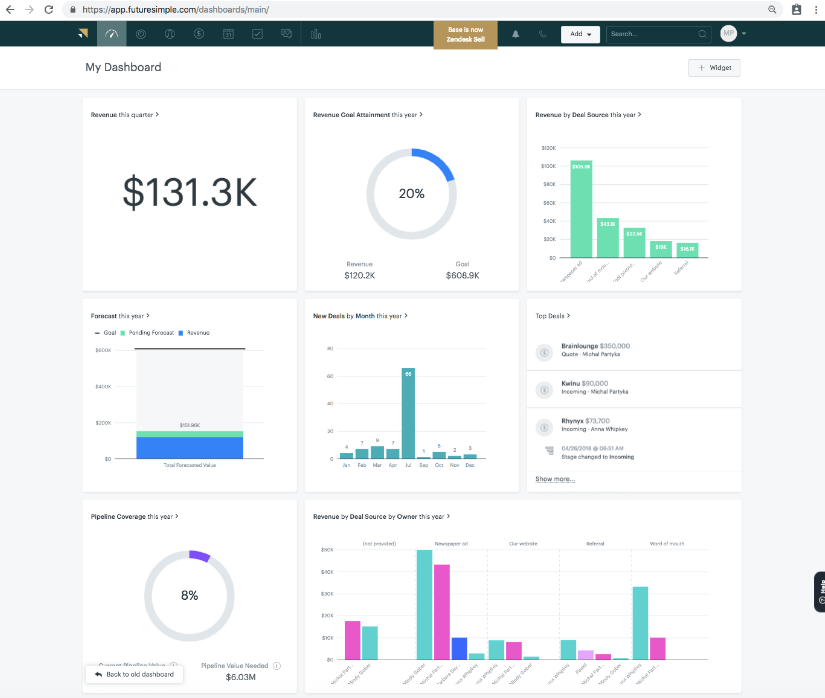
Distinctive features of ZenDesk
- Lead generation and management
- Intelligent ticket routing
- Contact management
- Sales forecasting
- Calendars and reminders
Intended audience
Zendesk is particularly well-suited for organisations that place a premium on exceptional customer service while concurrently seeking to implement a swift and efficient sales management process.
Zendesk pricing
Professional suite starts at £149 per agent per month, enterprise suite can be discussed with sales.
12. LeadSquared
LeadSquared is an enterprise CRM system designed to streamline and accelerate sales processes. It provides customisable workflows and structured sales planning to help deals progress efficiently through the pipeline, minimising the risk of delays or missed opportunities. Conditional task assignment ensures leads are dedicated to the most appropriate team member based on predefined criteria, improving both responsiveness and overall productivity.
The platform also features customisable dashboards with a comprehensive range of metrics and filters, enabling users to monitor key performance indicators effectively. With native connectors and a developer-friendly environment, LeadSquared supports flexible customisation and delivers robust sales force automation.
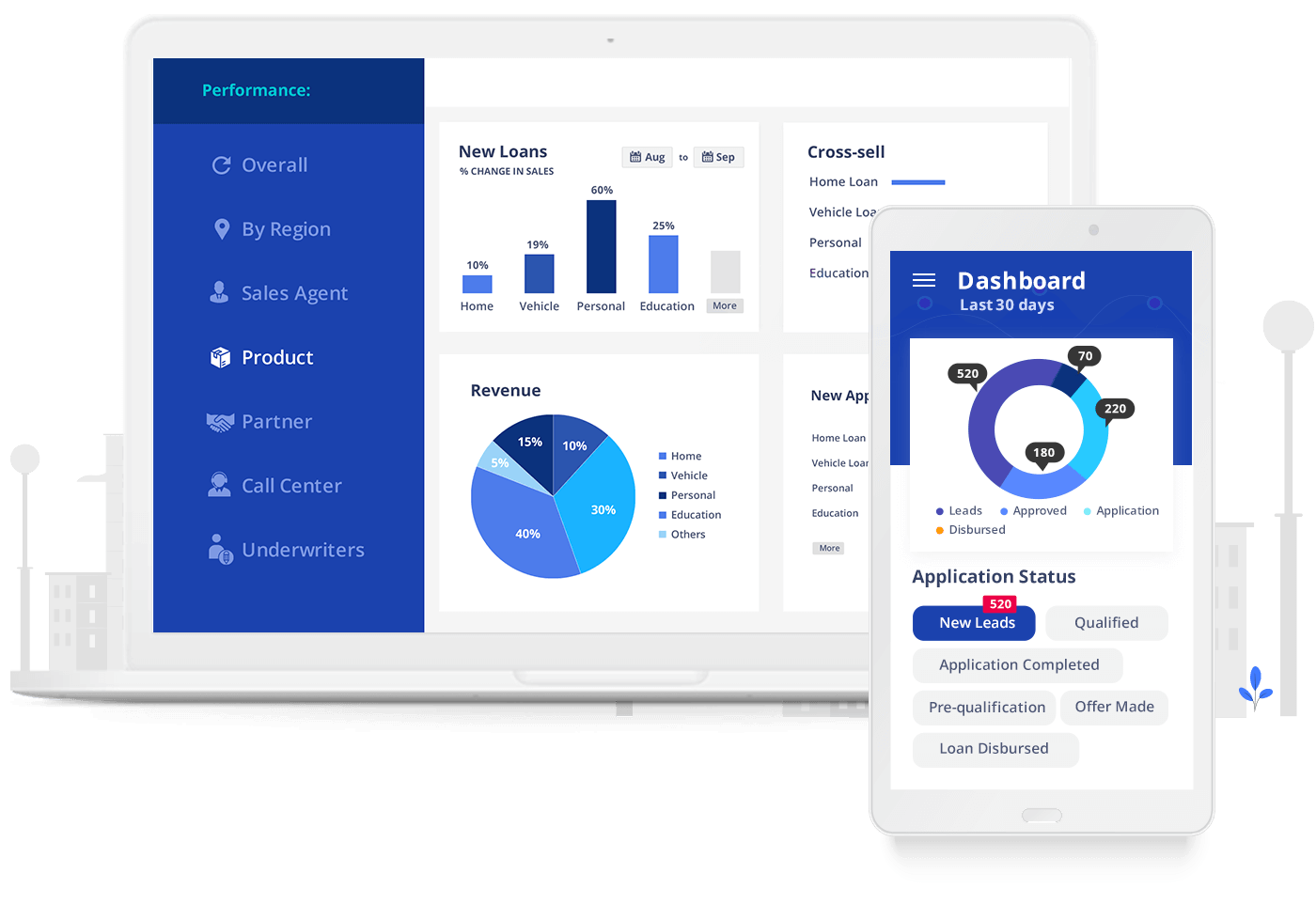
Distinctive features of LeadSquared
- Lead management
- Communications via click-to-call system
- Sales management and automation
- Individual and cross-team task assignment
Intended audience
LeadSquared primarily serves the needs of large organisations endeavouring to enhance the efficiency of their sales processes.
LeadSquared pricing
Pricing starts as £60 per user per month. Special rates are available for startups upon request
13. Pipedrive
Pipedrive is a user-friendly platform, well-suited for growing sales teams seeking a simple and effective solution for managing contacts and customer interactions. It provides a range of tools to support lead generation, deal assignments, contact management, custom workflows, and integration with other business software. The platform includes interactive dashboards for visualising sales pipelines, intuitive drag-and-drop functionality for deal tracking, and automation features that reduce manual data entry. With AI-powered insights, mobile accessibility, and seamless integration with third-party applications, Pipedrive helps teams manage customer data more effectively and enhance overall sales performance.
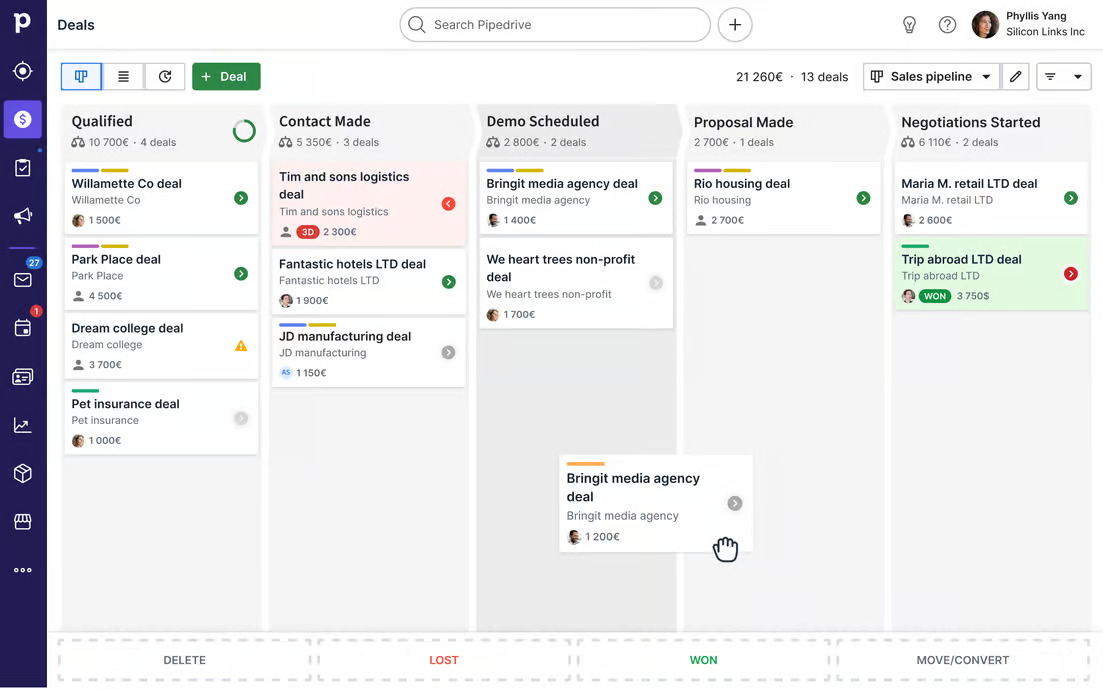
Distinctive features of Pipedrive
- Lead and deal management
- Campaign management
- Deal stage progress
- Security rules and alerts
- AI-powered sales assistance
Intended audience
Pipedrive is particularly well-suited for medium-sized enterprises that are in pursuit of comprehensive tools for the optimisation of their sales processes.
Pipedrive pricing
Pricing starts at £129 per user per month, a free 14-day trial is available.
14. Infor CRM
Infor CRM provides a comprehensive suite of sales, marketing and customer service capabilities, specifically designed to support sales pipeline management and drive revenue growth. The platform features tools for sales intelligence, advanced analytics, and customer tracking, enabling organisations to deliver more personalised sales experiences and strengthen customer relationships. It also supports configurable workflows and integrates seamlessly with other business systems, helping to streamline operations and enhance overall performance.
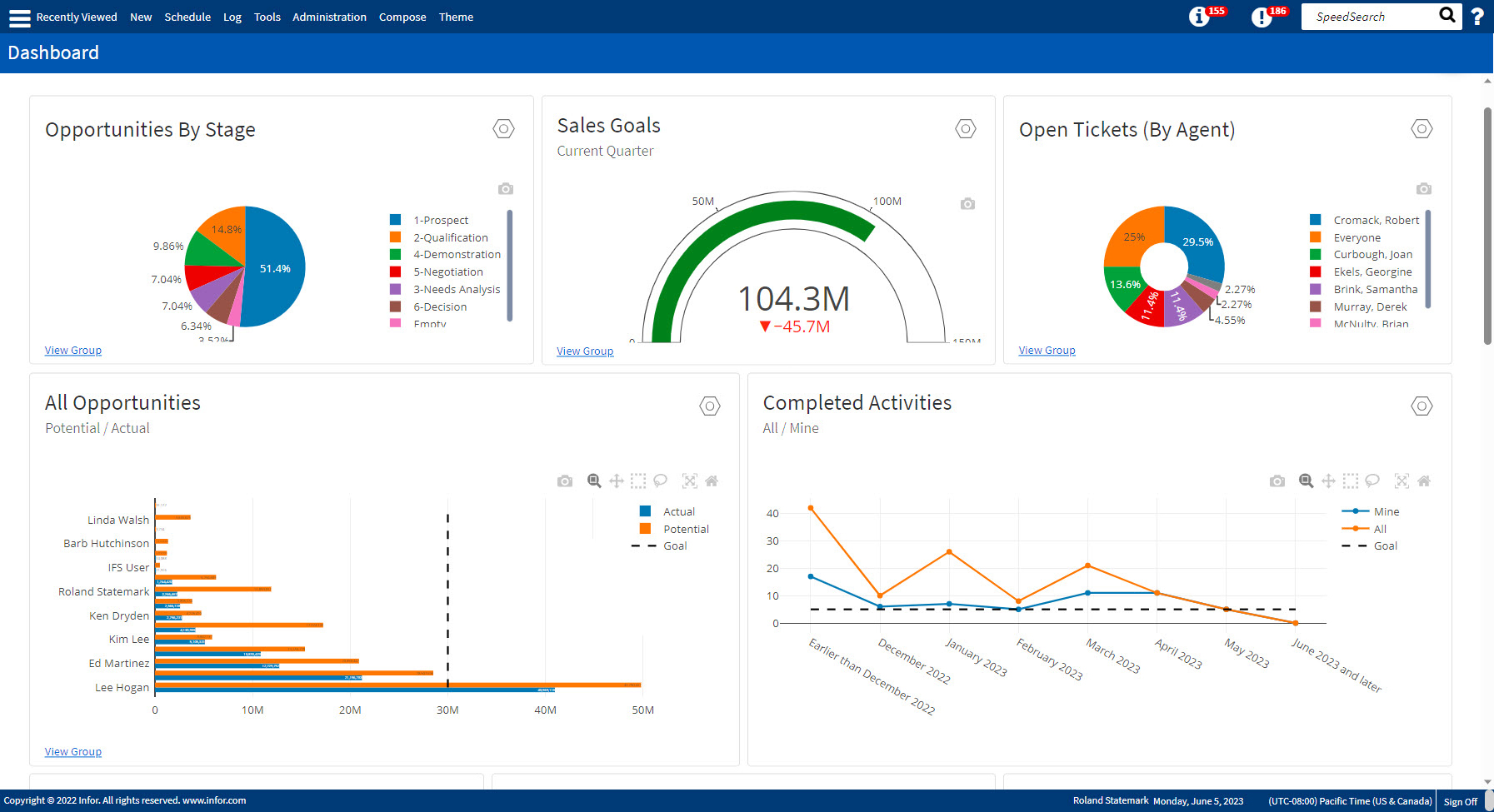
Distinctive features of Infor CRM
- Sales forecasting and management
- Rich customer profiling
- Reporting and analytics focused on industry and role-based reporting and analytics
- Mobile and tablet access
Intended audience
It is particularly well-suited for enterprises that are searching for holistic solutions within the realms of manufacturing, healthcare, and financial services.
Infor CRM pricing
£65 per user per month, a free trial is not available.
Enterprise CRM vs. CRM for small business? A strategic comparison
With such a wide array of CRM solutions available, many businesses face challenges in determining whether a small business (SMB) CRM or an enterprise-grade software is the better fit.
Understanding the key differences is essential, particularly for larger organisations, where the complexity of operations demands more robust functionality.
#1. A Comprehensive view of customer interactions
Enterprise CRM systems are designed to support all customer-facing operations, spanning sales, marketing, customer service, commerce and industry-specific workflows, and offer a truly comprehensive 360-degree view of the customer. By contrast, small business CRM software typically focus on just one or two areas, such as sales and basic marketing, providing a more limited scope of insight and capability.
#2. Advanced feature set
Enterprise CRM platforms offer a far broader and more sophisticated range of features than those typically required by small businesses. These may include AI-powered insights, predictive analytics, role-based access control, no-code customisation tools, and advanced reporting capabilities.
#3. More profound customisation
Enterprise CRMs offer flexible configuration options to accommodate complex workflows, industry-specific processes, and evolving organisational needs. In contrast, small business CRMs tend to offer more limited customisation, often relying on pre-defined templates.
#4. Broader integration support
Enterprise CRM platforms integrate seamlessly with a wide range of business systems, including ERP, BI, CPQ, document management, payment processing, and vertical-specific systems such as those used in banking, healthcare, or manufacturing. This level of integration ensures consistent data flow and delivers smoother, more connected customer interactions across all business operations.
#5. Cost efficiency at scale
Enterprise CRM solutions are designed to operate efficiently at scale, with pricing models that become more cost-effective as an organisation’s customer base and teams expand. In comparison, small business CRM systems often require additional upgrades or paid add-ons to handle larger data volumes and user numbers – capabilities that enterprise CRM plans typically include as standard.
How to select the suitable enterprise CRM?
Prior to committing to an investment in the most suitable enterprise CRM software for your organisation, there exists a series of inquiries to deliberate upon and a degree of research to undertake.
- Step 1: Identify your requirements and objectives: It is imperative to delineate the specific needs, goals, and challenges faced by your organisation. Ascertain which functionalities are indispensable for your operations, such as sales pipeline management, customer service capabilities, marketing automation, among others.
- Step 2: Consider scalability: Ensure that the chosen CRM possesses the capacity to scale in tandem with the growth of your business. Consider your future growth projections and assess whether the CRM can accommodate an increase in data, users, and functionalities as your enterprise expands.
- Step 3: Check customisation and integration: Seek a CRM that affords extensive customisation options, thereby enabling you to tailor the system to align with your business processes. Moreover, it should facilitate seamless integration with the existing tools utilised within your organisation.
- Step 4: Ask about vendor support and training: Evaluate the support services provided by the vendor, which should encompass training options, responsiveness of customer service, and the availability of resources for ongoing assistance.
- Step 5: Examine the cost and ROI. Consider the total cost of ownership, encompassing initial setup, subscription fees, customisation expenses, and potential additional costs related to integrations or upgrades.
By meticulously assessing these factors and aligning them with the specific requirements of your organisation, you shall be equipped to select a CRM that best serves your business objectives and enhances overall operational efficiency.
Unlock the power of enterprise CRM with Creatio
Enterprise CRM software serves as a strategic tool for aligning teams, automating complex workflows, and fostering long-term relationships with their customers. With advanced customisation capabilities, seamless cross-functional integrations, and data-driven insights, the right CRM becomes a critical asset for driving sustainable business growth.
Selecting the appropriate enterprise CRM requires a clear understanding of the features that align with an organisation’s objectives, and the value they deliver. It is important to choose a platform that not only meets current requirements but also offers the flexibility and adapt to evolving business challenges.
Creatio offers comprehensive enterprise CRM solution integrated on a no-code platform and powered by modern AI capabilities. Whether you're streamlining sales, marketing, or service operations, this platform provides end-to-end workflow automation, can seamlessly integrate with your tech stack, and offers maximum flexibility to adapt to evolving business needs.

